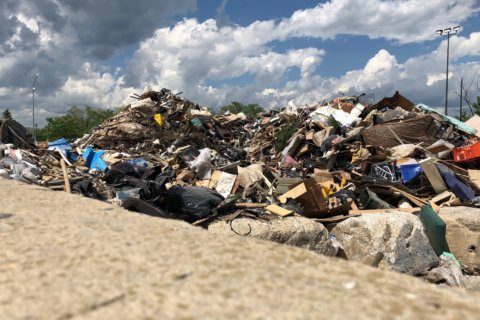It’s estimated that more than 300 million metric tons of plastic are produced each year — a number the United Nations Environment Program equates to the weight of the entire human population.
The fate for most of these bottles, bags and other products is the landfill, or worse, the natural environment.
In fact, a recent study published in the journal Science Advances found that of the 8.3 billion metric tons of plastic that’s been produced since the 1950s, 6.3 billion metric tons has become waste, and only 9% of that number has been recycled.
“Part of the reason for that is because we’re producing it in such huge volumes. Recycling systems are just not equipped to deal with the amount that we’re producing, and they might never be,” said Will McCallum, head of ocean campaigns at Greenpeace UK.
“Recycling our way out of the problem, it’s just not an option.”
Instead, he said making small changes to everyday habits is a good place to start when it comes to reversing the world’s current plastic crisis. In his book, “How to Give Up Plastic,” McCallum outlines tangible ways consumers can cut down on the amount of plastic piling up.
Start with ‘The Big Four’
McCallum said there are four simple changes consumers can make to significantly reduce their plastic footprint: Switch from single-use plastic water bottles to reusable bottles; bring reusable bags to the store to minimize disposable bags; take a reusable coffee mug to cut down on single-use containers; and say no to straws.
“Those four simple items can massively reduce your plastic impact,” he said.
Baby Steps
McCallum’s book walks readers through plastic-reduction strategies in each room of the home — from the bathroom, to the bedroom to the kitchen — to make the overall goal more attainable.
“Because like New Year’s resolutions, if you write a really long list of New Year’s resolutions, you’re setting yourself up to fail. It’s much better to pick up these habits one-by-one. Ingrain them … and then move on to the next,” he said.
In the kitchen, consider buying pantry staples (rice, beans, pasta) in bulk, and switch from single-use paper towels to cloth towels for cleaning.
Also, do some research: McCallum suggests scouting out stores that are committed to reducing plastic. For example, in the D.C. area, MOM’s Organic Market does not sell bottled water and has recycling centers for plastic food squeeze pouches. There are also online services that deliver food and household products in reusable containers.
Sweat the Small Stuff
Much of the plastic that pollutes the planet isn’t visible. McCallum said an estimated one-third of plastic in the ocean is microplastic — or plastic fragments and fibers less than 5 mm in length. One way these microplastics get into the ocean is from washing clothes made of synthetic materials.
“And they’re so small, they just go straight through the filter system and end up in the water and end up going into the ocean,” McCallum said.
While it may be difficult to completely eliminate synthetics from your wardrobe (especially for those who are athletic), McCallum said buying natural fibers when you can and washing clothes at a lower temperature and on a lower spin cycle can help cut down on the amount of synthetics that escape during laundry time.
Back to Basics in the Bathroom
Between the shampoo, body wash, face soap and hair products, the bathroom can seem like a black hole for plastic bottles. McCallum’s advice? Get back to basics with your personal care products.
“Some of the solutions are really old-fashioned — things like a bar of soap or moisturizer in a tin that you can more easily recycle,” he said.
If you have small children, consider saving disposable diapers and wipes for when you are out-and-about and switching to their reusable counterparts at home.
“And that’s still going to cut your plastic by maybe more than 50%,” McCallum said.
“Don’t make this all or nothing in your personal life. Do what you can, and that matters. Don’t not do something because you can’t do it, because you can’t give it up completely. Even giving up by 50% makes a big difference.”







